#notion template tips
Explore tagged Tumblr posts
Text
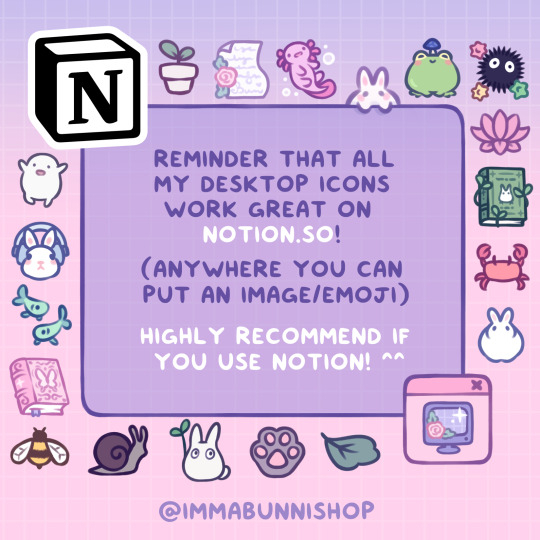
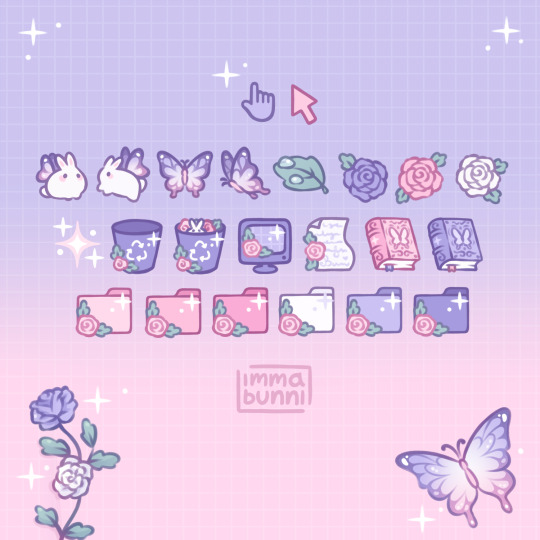
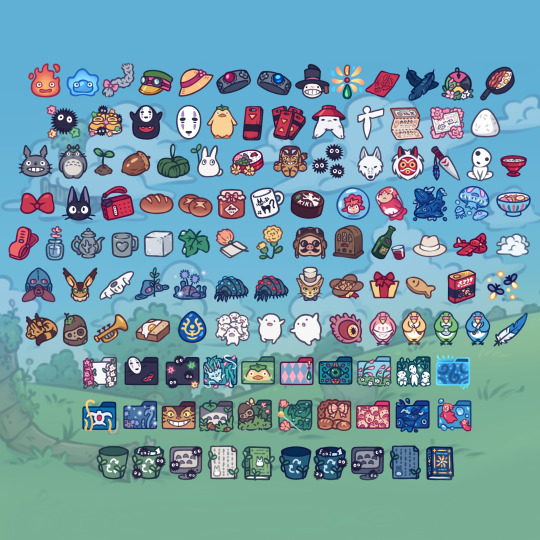

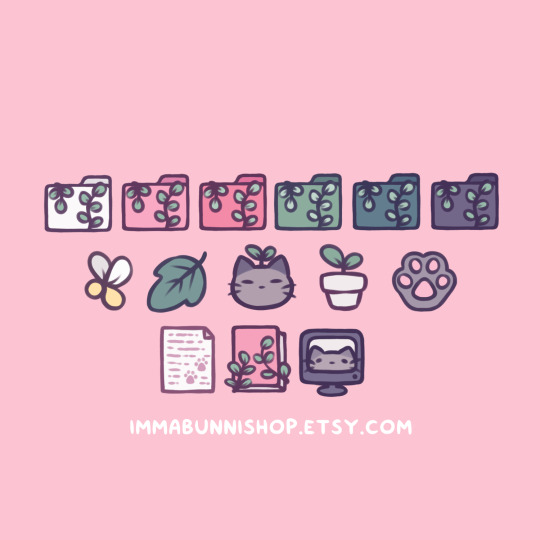
...and more in my shops! ♡ (and also some freebies on ko-fi/gumroad ;)
(ko-fi has every set, gumroad has ghibli, and etsy has everything BUT ghibli!)
I use these on my own notion all the time - it's amazing - definitely recommend! ✨👍🩷
13 notes
·
View notes
Text
✧ how i stay productive during summer break (while still having fun!) ✧





hey lovelies! ✨
summer break is finally here and honestly? it's my favorite time to both relax and get things done. i know that sounds contradictory but trust me, finding that sweet balance between productivity and fun is totally possible! after years of either doing absolutely nothing or burning myself out, i've finally found my perfect summer rhythm.
first things first: the morning routine ✨
i've learned that my day flows so much better when i start it intentionally. i wake up around 8 or 9 (not too early because we deserve some extra sleep!), make my bed immediately (small win!), and spend 15 minutes journaling before checking my phone. this tiny habit has literally changed everything for me.
my summer morning essentials:
iced coffee with oat milk and a tiny bit of vanilla
a cute journal that makes me excited to write in it
10 minutes of stretching by my window
a super quick skincare routine (sunscreen is non-negotiable!)
creating a flexible structure 🤍
the secret to summer productivity is having just enough structure without feeling trapped. i divide my days into three parts:
morning: productive focus time (2-3 hours max) afternoon: flexible time for errands, friends, or projects evening: pure relaxation and fun
this way, i never feel like i'm missing out or falling behind. the key is being realistic about what you can actually accomplish in a day. i used to make these impossible to-do lists and then feel awful when i couldn't finish them.
my productivity non-negotiables:
i always make sure to do at least one productive thing each day, even if it's small. some of my favorites:
reading 20 pages of a book
organizing one small area of my room
working on a creative project for 30 minutes
learning something new for my blog
planning content or taking photos
balancing productivity with summer fun ✨
here's my little secret: schedule your fun just like you schedule your work! this sounds silly but it actually helps me look forward to both. some of my favorite summer activities that feel refreshing but don't derail my productivity:
morning walks with an audiobook
afternoon picnics where i can also read or brainstorm
coffee shop work dates with friends
sunset swims after a productive day
weekend day trips that recharge my creativity
my favorite productivity tools:
a paper planner (something about writing things down just works better for me)
the forest app to stay off my phone when focusing
aesthetic notion templates for organizing my projects
time blocking in my calendar with cute colors
lo-fi summer playlists that help me concentrate
remembering the why 🤍
summer isn't just about getting things done or having the perfect instagram moments. it's about growing, reflecting, and creating memories that will make you smile in december when it's freezing outside. productivity should support your joy, not replace it!
i've found that my happiest summer days are when i accomplish something meaningful in the morning and then have the freedom to be spontaneous in the afternoon and evening. balance isn't perfect every day, and that's okay too.
what are your favorite ways to stay productive during summer break? i'd love to hear your tips too!
xoxo, mindy 🤍

#productivity tips#summer break#summer productivity#self improvement#college girl tips#study tips#balance#productivity hacks#summer routine#morning routine#summer vibes#aesthetic productivity#journaling#self care#time management#college student#college life#productivity aesthetic#summer activities#planner tips#notion template#coquette aesthetic#soft girl#glowettee#study motivation#productive summer#summer goals#summer planning#intentional living#slow living
439 notes
·
View notes
Text
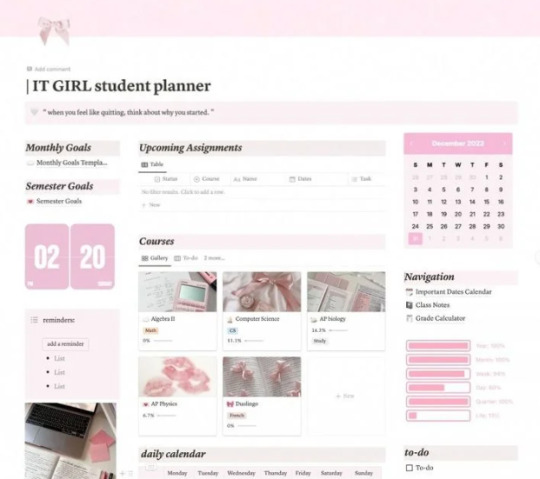
[FREE] Notion Template for Students
Hello! I’m thrilled to introduce my latest Notion template—the Tracker Notion Template, also known as the That Girl Student Planner—and yes, it’s totally FREE!
LINK HERE!!
This planner is crafted to help you track assignments, organize your study goals, and stay stylishly on top of your schedule. Perfect for adding a bit of glam to your everyday student life! This is the first version, so I’d love to hear your feedback and suggestions to make it even better.
Message me anytime with your thoughts—I’m here to make studying more fabulous and organized!
#notion#notion aesthetic#aesthetic#aesthetic notion#free notion templates#productivity#notion tour#free notion#digital planner#study aesthetic#notion tips#studyinspo#notion for students#productivity aesthetic#collage#university#student#habit tracker#planner#that girl#it girl
41 notes
·
View notes
Text
Finally, a properly dark academia-esque writing template. I've been trying to create one for ages.
Pics <3
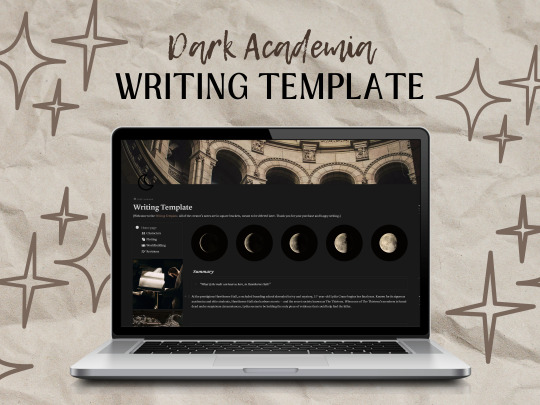
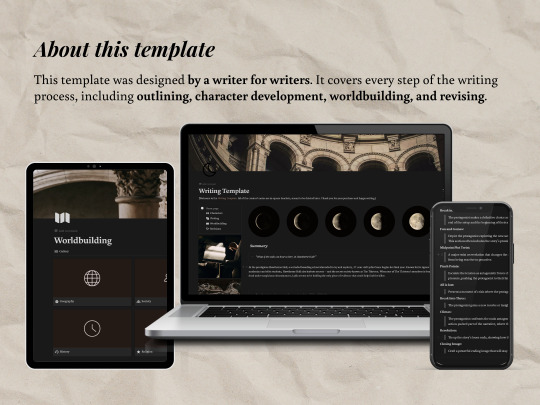
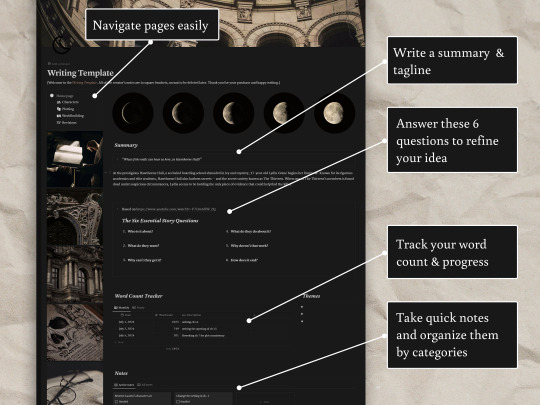
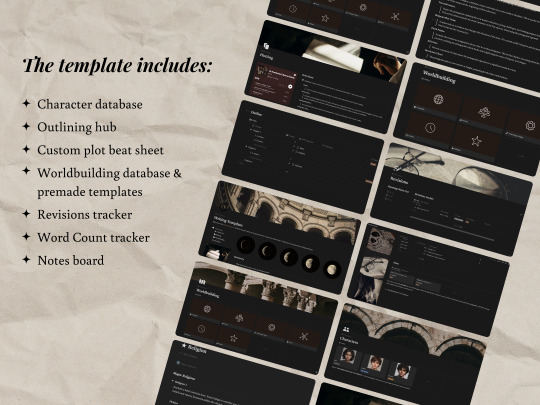
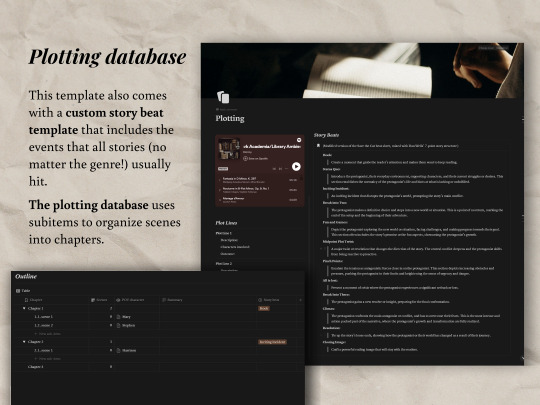
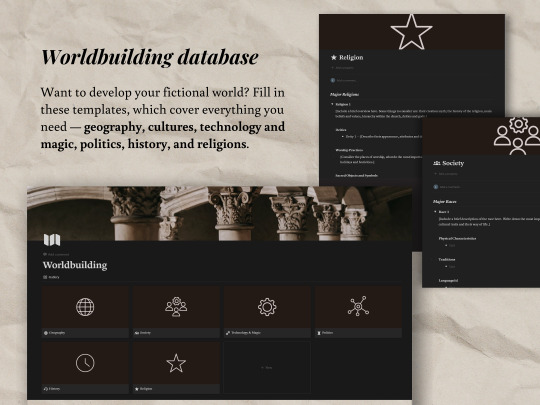
You can check it out here!
#notion#notion template#writing#notion writing template#dark academia#dark academia writing template#novel organizer#notion novel planner#notion templates#writing resources#writing a book#notion tips#novel planner#notion aesthetic#dark academia writing
60 notes
·
View notes
Text
Notion Grimoire Template (available in dark & light mode!)

I spent the better part of a year perfecting and finalizing my own personal Notion Grimoire, and thought it would be a great resource for new & experienced witches alike!




This template is chock-full of databases and templates to put in your own information - and I have also added a few pages that are already filled out!


You can purchase this template from my Etsy in light or dark mode, and you can use the code "IGOTCHU" for 20% off!
#thevirginwitch#witchcraft#witch#witchblr#witchy#witches of tumblr#pagan#tarot#beginner witch#grimoire#book of shadows#digital grimoire#digital bos#digital book of shadows#notion#astrology#spells#spell book#herbalism#herb magic#magic#baby witch#witch community#witchy tips#witch blog#notion template#notion grimoire#notion templates#chaos magic#magick
61 notes
·
View notes
Text
Notion Template Roundup
I found you some free aesthetically pleasing and functional notion templates and more!

Life
Entire Life Dashboard by ??
Bullet Journal Basic Template by Alyssa Lost in Space
Planners
Aesthetic Weekly Planner by Samantha Reily
Life Hub by Sija
School
College/High School Planner by Sija
Misc
35+ Free Aesthetic Dividers for Notion
Flaticon for free icons to make your page fit any vibes
Giphy for gifs to spice up your pages
Indify to make widgets for your pages
251 notes
·
View notes
Text
Worldbuilding Series: Magic System Masterpost

“Power swirled through their veins, burning tracks down their spine and bursting through the cracks in their mind.”
Magic. It’s one of the defining characteristics of the fantasy genre. A writer has unlimited possibilities to choose from when building their world and the magic that shapes it. Flying. Shapeshifting. Characters wielding fire or healing with a touch. Magic potions and runic spells. Demon magic and necromancy. Witch marks and superheroes.
This guide is designed to walk you through each step of building your magic, from choosing the structure to figuring out how it's cast and what powers are included. Hopefully by the end of this post you have a clear path to building a workable system of magic for your fantasy world.
Step One: Capturing the Feeling
Before we do anything else, take twenty minutes right here to do a free-write on what you want from your magic system.
Ask yourself: what emotions do you want your magic to create? In the reader? In your characters? In yourself? Do you want it to feel mysterious, mystical, disturbing, epic, powerful, sacred, moral, industrial, historical, epic?
You could also think about the story you’re telling: Is it an epic saga akin to Stormlight Archive or Wheel of Time? Or is it a smaller, character driven story like Fire by Kristin Cashore? Or a story about political maneuvering within a single kingdom like Twelve Houses by Sharon Shinn? The type of story you’re telling can help determine the magic system you use.
The bottom line is you want to capture the feeling of your magic.
Step Two: Choosing a Class
In my mind, magic systems fall into two major classes: Ability-Based and Spell-Based.
Ability-based is your basic superhero system — mages have a certain ability (or abilities), which could range from controlling light to super-speed. Their powers aren’t infinite. Mages could each have different, unique abilities, or they could choose from a set class (like Mistings from Mistborn).
Spell-based is your more classic magic — mages use power to cast spells, all (or most) have access to the same range of powers, and there are near infinite spells to choose from.
Like I mentioned in Step One, your choice should depend on the story you want to tell.
Think about your plot, world, and themes while we’re going through the two classes: which one will highlight or enhance the story you are telling?
Think about your characters: which class will fit them best?
Which one would you have the most fun writing?
Step Three: Theme
Once you know the class of your magic system, you need to consider its theme. This is where that free-write about the feeling of your magic is going to come in. Look at what you came up with. The emotions you wanted to evoke. The atmosphere. This is going to become your theme.
For instance — if you wanted your magic to feel disturbing, then maybe your theme will be necromancy or death magic.
Your theme is there to limit your magic. It will keep your system from feeling arbitrary, and will enhance the overall feeling of your world. It’s going to help you focus your abilities, powers, and limitations to create a unique system.
Step Four: Hard or Soft System
Some authors prefer to keep their magic shrouded in mystery and mysticism, while others love to lay out the rules and possibilities of their system with as much detail as a scientific experiment, with histories, theories, and runic charts in the back of the book (looking at you, Sanderson). Most systems are somewhere in the middle of the scale. You need to decide where you want yours to fall.
While deciding, consider Sanderson’s First Law of Magic: “An author’s ability to solve conflict with magic is directly proportional to how well the reader understands said magic.”
If your reader knows and understands your magic, then you can use your abilities, powers, and cool effects to solve problems.
If your reader doesn’t know the rules, the powers, or how your magic works, then any time you use it to solve problems or plot issues, it will feel like deus ex machina. Though you can still use magic to cause problems and make things harder for your characters.
Step Five: Your Magic's Source
What is the origin of your magic? Power has to come from somewhere, assuming your world follows the laws of basic physics (which it doesn’t have too, but I would recommend having some sort of accepted laws of reality).
A few things to think about:
Is your magic powered by the character themselves (does it exist inside them)? Or do they need to draw on an outer source?
Remember that you can combine sources — such as in Mistborn, where ingesting metals gives the allomancers power, but that power is ultimately fueled by the god Preservation.
For the future: the source of your magic is going to play a large part in the limitations, rules, and abilities of that magic. For instance, if magic is fueled by the caster’s own life energy, it will severely limit the amount of spells they can cast. But if magic is an unlimited river of energy that runs through everything (like the Force), it will be much more abundant for huge epic magics.
Step Six: Powers & Abilities
I’m sure you have some ideas already, but now is the time to solidify what powers your magic grants or what spells your characters cast.
Stick to Your Theme: The most important thing here is to limit your powers with your theme. If you don’t, you’ll loose the theme completely, and your system will feel arbitrary and overused. Try brainstorming a list of powers or abilities that could fall under your theme. Note that this is the same if you are designing a spell-based system of magic or an ability-based system.
If you’re having trouble coming up with powers, then make the limits of your theme more general. If your powers feel too disconnected and random, then make your limits more specific.
Here are some other questions to consider:
Do all of your characters share the same abilities? Do casters get to decide what their ability is (a conscious choice) or are they simply born with a certain range of magic? Are some things harder to do than others?
Have you given your characters abilities that make them too powerful? Could they break the world, tear a hole in reality, or some other effect that would make your plot meaningless?
Step Seven: Casting Your Magic
Waving a wand, drawing a runic spell, gathering your will, burning metal, singing the right notes, or speaking an objects true name. Whether it’s with a thought, a gesture, speech, or a material object, there are as many ways of casting a spell as there are spells to cast. Consider Your Theme and Story: The important thing here is to find how your characters use magic: what fits with your story, theme, and characterization? Will your characters cast spells against the forces of evil on a desolate battlefield, or will they use rituals and herbs to heal the sick in a wooded cabin, or sing their magic into being to cast illusions for the royal houses? An elaborate ritual won’t be very useful for a battle mage or a spy embedded in a foreign government.
Step Eight: Magic Users
You know what your magic can do, you know its source, and you know how it’s harnessed. Now you need to decide who has power.
Consider Your Characters and Story: how do those who use magic see themselves? How are they seen by others? Here are some questions for you to consider:
How accessible do you want magic? Is it limited to a certain few or can anyone use it?
If anyone can use it, do they? Or are there some who shun it?
Are mages simply born with magic, or can it be gained through training? Does it have to be stolen or bargained for?
Do people with magic think it’s a curse or blessing? Are your characters proud of their powers, or ashamed by them? How does this affect their personalities and motivations?
Consider Your Theme: go back to the feeling of your magic. What is it? What type of person fits into it? What kind of world does your magic exist in? Is it hidden and mysterious or built into the very fabric of your culture and civilizations?
Step Nine: Limitations
Consider Sanderson’s Second Law: Limitations > Powers.
This law is basically saying that your magic’s limitations should be stronger than your abilities. If your abilities are too overpowered, then your magic could end up breaking your story and plot.
The limitations of magic bring tension, drama, and risk to the story. They keep magic from being an easy way out by making your characters work harder, which can in turn up the stakes of your plot.
They can be the most interesting and engaging part of your system. For instance, mages that can control fire are pretty common, but what if a mage could only control fire if they were being burned at the time? That’s unique, interesting, and has story potential.
You build your limitations by determining the Rules, Cost, and Weaknesses of your magic. They may seem similar, and in some ways they overlap, but it’s important to consider each separately to build a complete system of magic.
Rules — what magic users must follow (could be breakable, with disastrous consequences, or absolute and above mortal control.) What can't your magic do? What are the limits or boundaries of its abilities? Remember, once you decide on your rules, you need to stick to them, or your magic won't feel believable.
Cost — the price a mage pays to cast magic. This could range from energy or stamina to actual life force or simply material cost or money. Remember, the higher your cost, the less your characters will use their magic.
If you want it to be a common and everyday thing, then you need a small, manageable cost.
If you want magic to be used only as a last resort, then have a high cost that few would think is worth paying.
Weaknesses — where does the magic fail? What can’t it do? How can it be beaten? What ways would the opposite side overcome the advantage of the mage’s power, workaround it, or make it useless? Weaknesses are intertwined with both the cost and rules of your magic, and so they may overlap. Take a look at your rules and costs and extrapolate to find the weak points of your magic.
For instance, if a rule of magic is that a mage has to see something in order to cast a spell on it, a weakness would be that their enemies could simply stay out of sight, or find a way to blind their opponent in order to make their magic useless. Could an enemy permanently blind a mage, and take away their power forever?
Step Ten: Extrapolation & Organization
Go deeper, not wider: a magic with unlimited power can be fun to play with, but it could be more unique to have a magic with a small collection of powers, that are each explored in depth.
Remember Sanderson’s Third Law of Magic: “Expand what you already have before you add something new.”
Before you start to add multiple abilities, schools, types, or magic systems together, consider the implications of what you already have: even an ability as simple as making plants grow could be used in dozens of different ways.
Could your character bring down a building by crumbling the foundation with tree roots? Could they grow a poison to take out an enemy? Could they grow foliage in order to hide from pursuers? Or grow a vine to climb up a cliff? How could your characters solve their problems, using what they have in different or unique ways?
Two characters with the same power can use that power differently. This can be a good way to go deep into characterization and personality, and really show how each character sees the world. Perhaps the power is manipulating bone — one character might use their power to heal, and mend, while another might use it to break bones and control their criminal empire.
Step Eleven: Name of Magic
There’s a lot to consider when naming your magic: here are a few questions to ask yourself.
What’s the magic itself called? Magic? Mana? Force? Energy? Or something unique like Aon Dor or BioChromatic Breath?
What are mages called? Wizards? Casters? Or something like Mistborn, Shapers, Riders, Radiants, or Powder Mages?
What is the act of magic called? Do mages cast a spell? Or weave a thread of magic? Or burn metal? Or draw in Stormlight?
Are there multiple names for the magic or magic users? If you have different cultures, nations or planets, perhaps they have their own words for mages. Like Dragon Riders and Argetlam (meaning silver hand) from Inheritance Cycle.
Consider your theme, or an element of your theme: what is the main focus of your magic? Does it have to do with fire? With metal? With wood or plant growth? Whatever it is can help you decide your names and terms.
Perhaps your characters are members of the thieves guild, and they’ve been hired to steal a magic gem from a corrupt lord. Perhaps magic in this world manifests as an ability to see through any wall, a skill perfect for thieving, so Thief is synonymous with mage.
____________________________________________________________
Just Like Magic! And that’s pretty much it. You now have a working magic system. As you start to write your story and further flesh out your world and characters, you’ll need to edit your magic accordingly. You’ll always be thinking of new things and exciting additions, but now that you have the bones, your magic system can grow to be functional, unique, and engaging for your readers.

This blog post was my very first draft at building a magic system and was originally posted on my website blog here. I later turned it into an even more depth guide in my downloadable Magic System Worldbuilding PDF Workbook and my even more extensive Ultimate Magic System Notion Template (found in my gumroad shop or my etsy shop!)
#my stuff#fantasy writing#notion template#worldbuilding stuff#fantasy worldbuilding#world building#fantasy writers#worldbuilding advice#worldbuilding tips#fantasy world#fantasy authors#writblr#magic system#fantasy magic systems
16 notes
·
View notes
Text

Witchcraft ingredients database notion template
Use code "TUMBLR50" for 50% off
#notion aesthetic#notion dashboard#notion inspo#notion setup#notion templates#notion tips#notion.so#witchcraft#witchy
15 notes
·
View notes
Text
My life looking tidy thanks to Notion 🗞️☁️
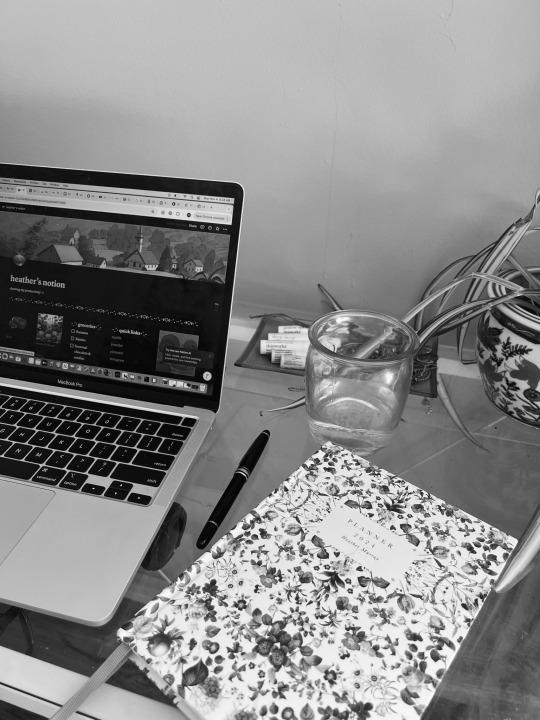
Here’s my fall theme, which I hope to keep a bit longer before winter sets in! 🧡



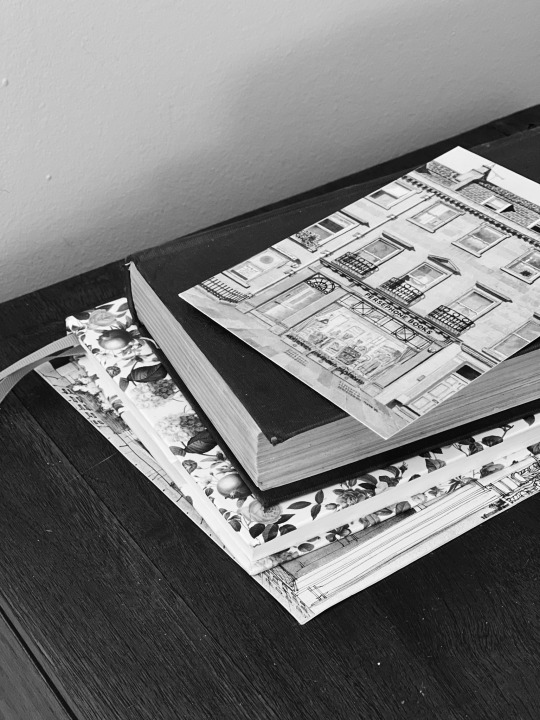
While I use this for planning my novel, I also organize my notes for Homeward, my newsletter. (It’s as irregular as it is intriguing, like a letter from a good friend).
See more of my writing content here and my main blog @heather--moors
MY PINTEREST, AKA MY HAPPY PLACE
#notion template#digital planner#writer#productivity tips#study inspiration#studyblr#study aesthetic#writer life#productivity challenge#productivity aesthetic#productivity boost#personal growth#growth mindset#writing community#writing#mine#notion writing template#dark academia aesthetic#aesthetic notion template#novel planner#novel planner template
16 notes
·
View notes
Text

Here's my free migraine tracker!!
#notion#notion creator#notion dashboard#notion template#aesthetic notion#productivity#intentional living#planner#migraine#health tracker#mental health#health & fitness#notion inspo#health#headache#wellness#life planner#freebies#notion tips#chronic migraine#chronic pain#minimal#study aesthetic#daily routine#morning routine#evening routine#migraine relief#migraine awareness#light academia
87 notes
·
View notes
Text
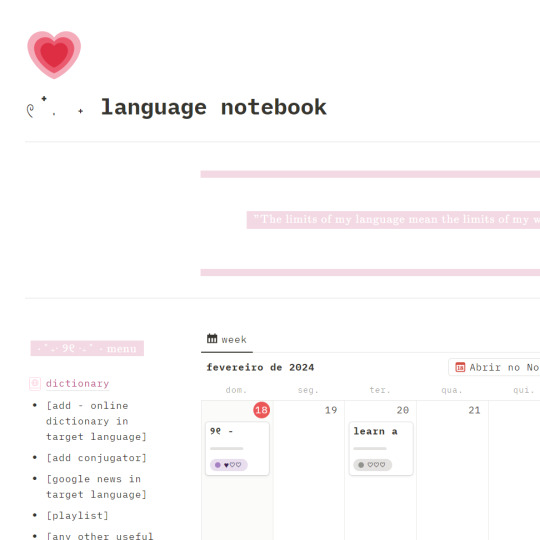

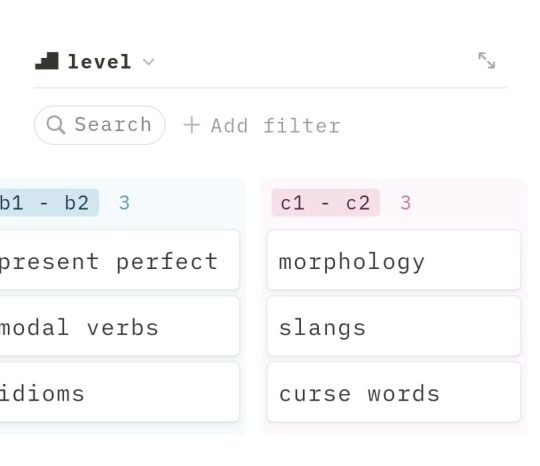
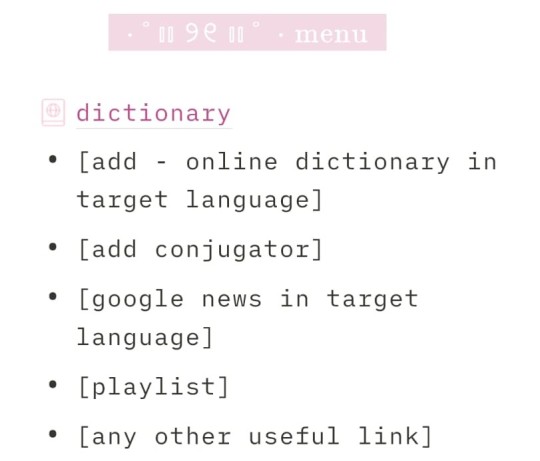
LANGUAGE LEARNING - NOTION TEMPLATE
(but make it girly <3)
Get the template here! [$2]
Language learning, the template contains:
Daily tasks to improve your studies
Challenge list
Synchronized dictionary (noun, verb, adjective, adverb)
Notebook area: create topics and take notes, divided by the CEFR Levels
Mobile friendy
#notion#notion template#studyblr#language learning#langblr#langblog#language tips#studies#languages hub#spanish#english#italian#french#duolingo#vocab#bilingual
42 notes
·
View notes
Note
hey mindy mindy its me again (after that chaotic love poem lmaolmao) mwah mwah can u do like a notion guide post ?? like what would be helpful to add and also how you set yours up?? that would be so so helpful ilyily have the best day and sleep tight mwah mwah kiss kiss love xoxo, emily
hey emily! ✧
omg hi again!! (the love poem chaos was iconic btw, never apologize for that) you truly are my biggest fan (and i'm yours <3)
✧・゜: my notion setup: organized chaos but make it cute :・゜✧:・゜✧

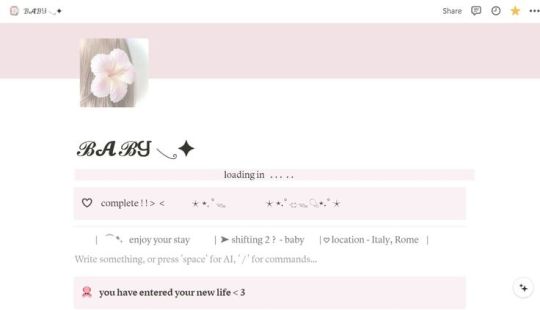



so you asked about my notion setup and i'm soo excited to share because i've gone through approximately 500 iterations before finding what actually works for me! and by "works" i mean i've stuck with it for more than 3 weeks which is honestly a personal record.
the thing with notion is that it's so customizable it can be overwhelming?? like, i spent more time watching "perfect aesthetic notion tour" videos than actually using the app for the first month. classic me behavior.
⋆.ೃ࿔:・ getting started (without spiraling) ・:࿔ೃ.⋆
first things first - don't try to set up your entire life system at once! i made this mistake and abandoned notion for 2 months because it felt too overwhelming.
start with ONE area that's currently chaotic in your life. for me it was school assignments because i kept forgetting deadlines until 11pm the night before (and then panicking while eating peanut butter straight from the jar… not recommended).
my biggest tip is to not get caught up in making it pretty right away. i know that's like, counterintuitive coming from me, but functionality first, then we make it cute!
⋆.ೃ࿔:・ my actual setup ・:࿔ೃ.⋆
homepage: i have a super simple homepage with links to my main dashboards (school, blog, personal) and a little daily quote that changes. also a tiny photo of my cat judging me for motivation.
school dashboard: this is my most used section! i have a calendar view of assignments, a database of all my classes with linked notes, and reading tracker. the best part is the assignment database where i can filter by due date and subject.
blog dashboard: where i keep all my post ideas (like this one!), content calendar, and stats tracking. i also have a section for brands i want to work with someday (manifesting!).
personal dashboard: this has my habit tracker, journal prompts, and goals. i also keep recipes here because i was tired of screenshots getting lost in my camera roll.
reading nook: where i track books i've read/want to read with little ratings and notes. sometimes i write embarrassingly emotional reactions to plot twists that no one else will ever see.
⋆.ೃ࿔:・ the actually helpful stuff ・:࿔ೃ.⋆
okay so beyond the basic setup, here are things that have made notion actually useful for me:
templates!! i have templates for everything - blog posts, class notes, weekly planning. it saves so much time not starting from scratch.
linked databases are literally magic. i can have the same information show up in different places filtered different ways. like my assignments appear on my homepage as "due this week" but in my school dashboard i can see everything.
embeds are underrated. i embed my spotify playlists, google calendar, and pinterest boards so everything's in one place.
toggle lists for anything lengthy. they keep things looking clean but you can expand when needed.
color coding that actually means something. i used to just pick pretty colors but now each color has a purpose (red = urgent, blue = school, pink = blog, etc).
⋆.ೃ࿔:・ making it pretty (because we still care) ・:࿔ೃ.⋆
once the functionality is working, THEN we make it cute:
i use a consistent color palette across all pages (mostly soft pinks, lavender, and sage green)
custom icons for each page (there are free packs online or you can use emojis)
cover images that are cohesive (i use pinterest)
font consistency! i stick with the same headings and text styles
little decorative dividers between sections (just search "aesthetic dividers" and you'll find tons)
⋆.ೃ࿔:・ my honest thoughts ・:࿔ೃ.⋆
the truth is my notion isn't instagram-perfect all the time. some sections get messy when life gets busy, and that's fine! the beauty of it is you can always clean it up later.
the pages i actually use daily are pretty simple. it's the ones i rarely visit that look the most aesthetic (because they're not battle-tested with real life, lol).
start simple, find what actually helps you, and then make it pretty enough that you want to use it. that's the real secret!
let me know if you want more specific details about any part of my setup! i could literally talk about this forever (as you can probably tell from this novel of a response).
sending you the most organized vibes! hope this helps!!
xoxo, mindy 🤍
p.s. sleep tight to you too! currently writing this at 1am because i have no concept of proper sleep schedules

#notion setup#notion guide#notion tips#notion organization#notion for students#notion tutorial#notion templates#notion dashboard#notion aesthetic#notion for beginners#notion productivity#notion planning#notion school#notion blog#organization tips#digital planning#productivity system#student organization#notion layout#aesthetic organization#notion for bloggers#digital organization#notion workflow#notion hacks#productivity tips#organization system#digital planner#notion tour#study organization#study tips
59 notes
·
View notes
Text
hey there ~ just dropped the ultimate home management notion template with planners for cleaning, meals, pets & plant care <3







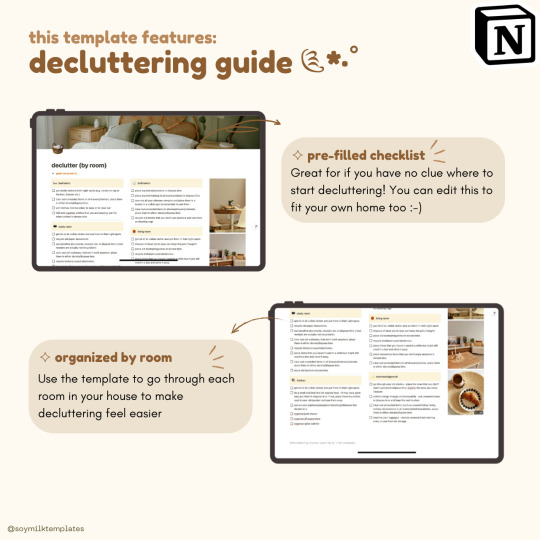


this is avail on my etsy hehe !!
#cleaning#houseplant care#notion#aesthetic#productivity#notion template#house cleaning#home cleaning#cleaning tips#home organization#home projects#decluttering#life planner#plant care#pet care#meal plan#healthy eating#recipe book#meal planning
10 notes
·
View notes
Text
Notion Template for Psychologists ( Anxiety Management Plan )
#template#notion#notion template#writing#writer#writer resources#writers#writeblr#writer tips#writerscommunity#writing advice#writing inspiration#writing help#authors#template for writers#notion for writers#author struggles#creative writing#dark acadamia aesthetic#dark academia#classic academia#notion dark academia#resources for writers#writers on tumblr#fiction#fiction writing#thriller#dark romance#aestethic#writing resources
5 notes
·
View notes
Text
New Notion Template
Dark Academia Homebase
#notion#notion template#dark academia#dark aesthetic#romantic academia#chaotic academia#journal#journal prompts#bullet journal#self care#self love#notion tips#goal#goals
4 notes
·
View notes
Text
All in one Finance Tracker
Custom formulas for ease of use
Track Income
Track Expenses
Currency Converter
Track Budget
Track Spending
And much more
Collect Now: https://stan.store/TheDigitalCortex/p/the-digital-finance






#notion template#notion dashboard#notion#personal finance#finance tips#finance solutions#notion setup#notion app
3 notes
·
View notes